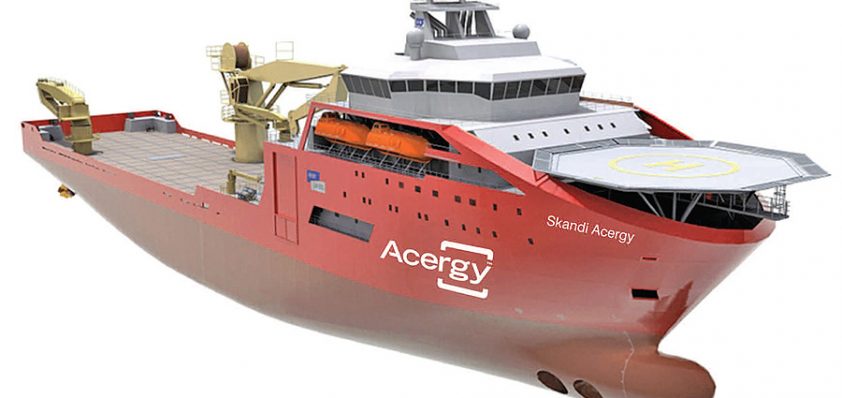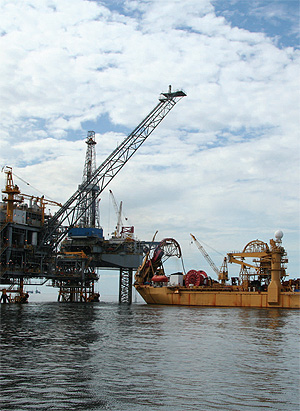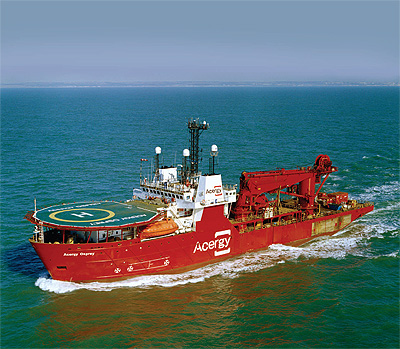
Acergy
From seabed to surface
Acergy started life in the early 1970s, pioneering the emerging North Sea oilfields as Comex and Stolt-Nielsen Seaway.
Four decades on Acergy has developed both organically and via acquisitions, to become a leading seabed-tosurface contractor for the offshore oil and gas industry worldwide.
In 2003, Acergy put in place a new ‘blueprint’ for the group; consolidating its offer to Subsea construction, Umbilicals, Risers and Flowlines (SURF), Inspection, Maintenance and Repair (IMR), Conventional Field Development services and Trunkline Installation. In 2005 following the sale of Stolt-Nielsen’s remaining shares, the company embarked on a new phase in its evolution. In February 2006 the company announced the new name ‘Acergy’ to the world. At the same time a clear vision was set ‘to be the acknowledged leader in seabed-to-surface engineering and construction’.
To achieve this vision Acergy understands the actions that need to be. Critically Acergy must be a trusted partner for clients and a provider that delivers on time, within budget and to the highest  quality standards, while making safety and security an absolute priority.
quality standards, while making safety and security an absolute priority.
Acergy operates on a global basis, as Mark Preece, vice president of Business Development at the company, explains: “We are headquartered in London, UK and operate in all the major offshore oil and gas regions in the world. We are organised around five geographical regions and each region has its own management structure and team. The five operating regions are, Africa and the Mediterranean, Asia and Middle East, North America and Mexico, Northern Europe and Canada and South America.”
Acergy aims to meet the needs of all of its clients through an organisational structure flexible in responding quickly and sensitively to local demands. It also leverages the full strength of Acergy’s global resources and know-how. Mark continues: “Along with all our own operations, we also have a number of joint ventures. Our joint ventures are with NKT Flexibles, Seaway Heavy Lifting, SapuraAcergy and Sonamet.”
Danish-based manufacturer, NKT Flexibles, produces flexible pipes, including dynamic and static risers, static flowlines, subsea jumpers, topside jumpers and expansion joints. Seaway Heavy Lifting is a well-established offshore contractor, based in the Netherlands. Seaway operates the heavy lift ship Stanislav Yudin, fully equipped for the installation and removal of major offshore structures. SapuraAcergy, in partnership with Sapura Crest Petroleum of Malaysia, operates the Sapura 3000, a heavy lift pipelay and derrick vessel in the Asia Pacific region. Lastly, Sonamet, in partnership with Sonangol and Wapo International, produces high-quality fabrications for oil companies operating both shallow and deepwater projects off the coast of Angola.
Acergy is primarily a seabed-to-surface engineering and construction contractor, planning, designing and delivering complex, integrated projects in harsh and challenging environments. The company divides its business into principal areas of operation: Subsea Umbilical Risers and Flowlines (SURF), Inspection, Maintenance and Repair (IMR), Conventional Field Development, and Trunklines. It supports operations in these areas with a highly adaptable fleet of ships and a range of additional services. Acergy concentrates on providing services that add value for clients throughout the lifecycle of their offshore oil and gas fields.
People are central to Acergy’s success and most of the company’s employees share certain key characteristics, these include, a high level of professional expertise and an intrinsic commitment to safety and the environment. Acergy employees receive excellent training and support, highly competitive remuneration packages and ongoing professional development programmes that aim to be the best in the industry.
Undertaking numerous offshore projects, Acergy has developed an unrivalled knowledge of the field it operates in. The company’s most recent project was the Langeled Pipeline Installation. This headline project called for the installation of 822 kilometres of 44” and 42” gas trunkline between Nyhamna in Norway and Easington in the UK. Work on the project took place during both 2005 and 2006. The technical demands of the project meant that extensive upgrading of Acergy’s lay barge, Acergy Piper, was required, along with specific training for operational personnel. In 2005 the company laid over one million tonnes of pipe for the project, with another half million in 2006. Acergy completed over two million man-hours on the project in 2005 with zero time lost to injuries – a statistic that led to the organisation’s nomination for the Statoil CEO’s safety prize.
Mark explains: “Langeled was a fantastic project for us, we laid in the water approximately a million tonnes of steel each year over a two year period. We carried out over 80 per cent of the total pipeline installation work and it was a tremendously successful project. It was carried out without any loss of time incidents or safety issues, which is of paramount importance to us and our clients.”
Acergy has recently been awarded a deepwater installation contract by Chevron Frade LLC, a subsidiary of Chevron, which is the Frade field development located in the Northern Campos Basin in Brazil. This contract is for the installation of a 41 kilometre flexible gas import/export pipeline between the Frade FPSO and the Roncador pipeline manifold, together with flexible risers and well control umbilicals, in water depths ranging between 100 to 1200 metres. Offshore installation is scheduled to take place throughout 2008.
One of the largest projects in Acergy’s history is the Greater Plutonio project in Angola. This was from BP Angola for the engineering, procurement, fabrication and installation of umbilicals risers and flowlines on the Block 18, Greater Plutonio field. The contract was awarded to a consortium of Acergy and Technip. Acergy led the installation of over 75km of 12-inch diameter insulated  production, gas injection and service flowlines and 103km of umbilicals. In addition, the consortium installed 12 FPSO mooring lines and ten production manifolds, to tie-in the subsea wells and the final hook-up of the FPSO by means of a single riser tower.
production, gas injection and service flowlines and 103km of umbilicals. In addition, the consortium installed 12 FPSO mooring lines and ten production manifolds, to tie-in the subsea wells and the final hook-up of the FPSO by means of a single riser tower.
The diversity of Acergy’s projects demonstrates its commitment to expand its position in the growing market. Every new project for the company presents unique challenges and it meets these challenges with some of the industry’s most experienced project management teams. Project management is one of the company’s core competencies and sets Acergy apart from its competitors. The organisation’s project management skills have developed over more than three decades in some of the world’s harshest operating conditions. These teams have industry leading logistical support, supply chain management, and the assets needed to safely execute each project.
Acergy’s vision is to be the world leader in health, safety and environmental protection too. HSE is at the heart of all the company’s operations and is never an optional extra. Mark explains: “HSE is an absolute key requirement and clients quite rightly demand and expect it. We are always striving to improve HSE and be pro-active in terms of working with people to help us on behavioural attitudes. In our business, safety incidents in particular have dramatically reduced in the last ten years and that’s mainly down to the behavioural attitudes of our workforce.”
Everyone in the organisation is expected to show responsible leadership. Wherever potential risks are identified it is not enough simply to report the problem – Acergy expects everyone working within the company to actively intervene. Mark continues: “We are constantly working with people on behavioral safety and their attitudes towards HSE. This is a challenge for the senior management team and we want to convince our clients that we will do whatever it takes to create that safe environment.”
All the projects Acergy undertakes in remote and hostile environments present their own set of challenges and risks. A key task for the company’s project managers is always to evaluate the risks involved at every stage of the project lifecycle, and take steps to eliminate or mitigate them as far as possible. Acergy aims to push back the boundaries of undersea development and construction, but always in safe, sustainable ways.
In keeping with its vision of becoming the acknowledged leader in seabed-to-surface engineering and construction, Acergy aims to reach the attainable goal of zero injuries, zero damage to assets and the environment and zero near misses. In order to reach this goal, the company has set up acclaimed PASS (Positive Attitude to Subsea Safety) training schools in every operational region. PASS courses are designed to drive further improvement by delivering a common message to all its employees and delivering general, intermediate and advanced HSE training courses appropriate to everyone at Acergy.
PASS HSE training is widely recognised as some of the most effective training available in the offshore sector. Many external organisations also looking to improve their performance send their employees to PASS, making Acergy’s training schools a recognised safety brand in their own right.
Its track record in anticipating and managing all types of risk is one of the reasons why Acergy’s projects run on schedule and within budget. Its clients can depend on Acergy to take care of health, safety, security and environmental considerations and risk management. Projects in different parts of the world fall under the regulatory regimes of local governments. Wherever in the world Acergy operates, all its projects always meet or exceed any applicable risk management and safety legislation.
Acergy takes its responsibilities to the communities in which it operates, and to the world as a whole, extremely seriously. Globally it seeks to manage its business to the highest standards, in a way that minimises its impact on the environment and has a positive impact on society. Each region then develops community and social activities that are sensitive to local needs. These include investments in the development and wellbeing of people, taking interest in social matters that directly and indirectly affect its business and establishing good relations, which benefit the communities in which the company operates. To further enhance this, Acergy’s community and society programmes are constantly evolving.
Looking to the future, Acergy aims to use its global positioning to its advantage: “We act as one global organisation using all our different locations across the world to meet our clients’ demands. We can maximise our efficiency by locating our project teams wherever the work activity is rather than being restricted to certain areas. The scale of Acergy definitely helps us to gain new contracts and provide our clients with the best service we can offer,” Mark explains.
He continues: “One of the key qualities that we are keen to develop in the company is client relationships. In the last 18 months we have implemented a global account management program where we now have a number of senior members of staff who are dedicated to managing our major accounts. This has already reaped benefits both to our clients, and us and we hope this will continue into the future.”
Mark concludes: “Over the next couple of years we aim to improve the safety and efficiency of our business. We want to grow the company but in a very orderly and managed fashion. Acergy has made huge transformation changes recently and we intend to continue with this long into the future.”
Acergy
www.acergy-group.com